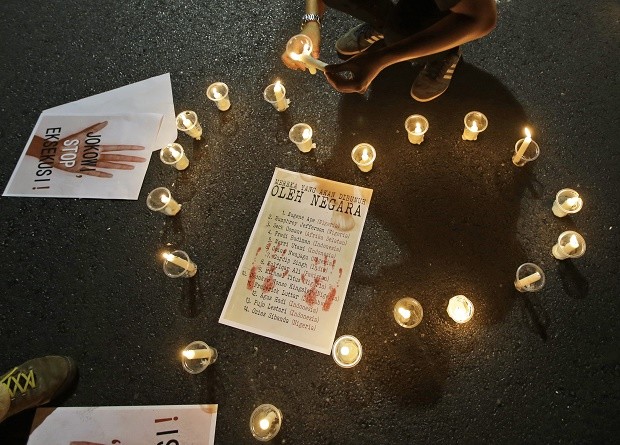
An activist lights candles arranged around a poster containing the names of death row inmates who are facing imminent executions during a vigil against death penalty outside the presidential palace in Jakarta, Indonesia, Thursday, July 28, 2016. Indonesia rebuffed appeals from distraught relatives, rights advocates and foreign governments to abandon plans to execute the 14 people for drug crimes as preparations intensified at the prison island holding the inmates. Writings on the poster read: “Those who are about to be killed by the state” and “Jokowi (popular nickname of Indonesian President Joko Widodo), stop the executions!”. AP
CILACAP, Indonesia — Indonesia executed four people convicted of drug crimes on Friday despite international protests and said it would decide later when as many as 10 others would be put to death.
One Indonesian and three Nigerians were executed by firing squad not long after midnight local time as torrential rains hit the Nusa Kambangan prison island where the death row inmates were held.
The government had said earlier in the week that 14 people on death row, mostly foreigners, would be executed for drug crimes.
Those executed were Indonesian Freddy Budiman and Nigerians Seck Osmane, Michael Titus and Humphrey Jefferson.
Relatives, rights groups and foreign governments had urged Indonesia to spare all 14 lives but it was unclear whether that had any influence on the decision to not carry out all the executions at once. Lawyers and rights groups had raised serious doubts about the legitimacy of the conviction of Jefferson as well as the convictions of an Indonesian woman and a Pakistani man.
It was the third set of executions under President Joko “Jokowi” Widodo who was elected in 2014 and campaigned on promises to improve human rights in Indonesia.
Deputy Attorney-General Noor Rachmad said the severity of the drug trafficking crimes was a consideration in the execution of the four men. A decision about other executions would be announced at a later time, he said.
“It was not a pleasant thing but it was to implement the law,” said Rachmad. “The executions are only aimed at halting drug crimes.”
READ: UN rights chief calls for ban on executions in Indonesia
A convoy of 17 ambulances, most carrying coffins, had arrived Thursday morning at the port town nearest Nusa Kambangan. Officials began tightening security at the prison several days ago, with more than 1,000 police sent to Cilacap, the port town, and the island.
Last year, Indonesia executed 14 people convicted of drug crimes, mostly foreigners, sparking an international outcry.
The bodies of Osmane and Titus will be flown to their home country and Jefferson will be buried in Indonesia.